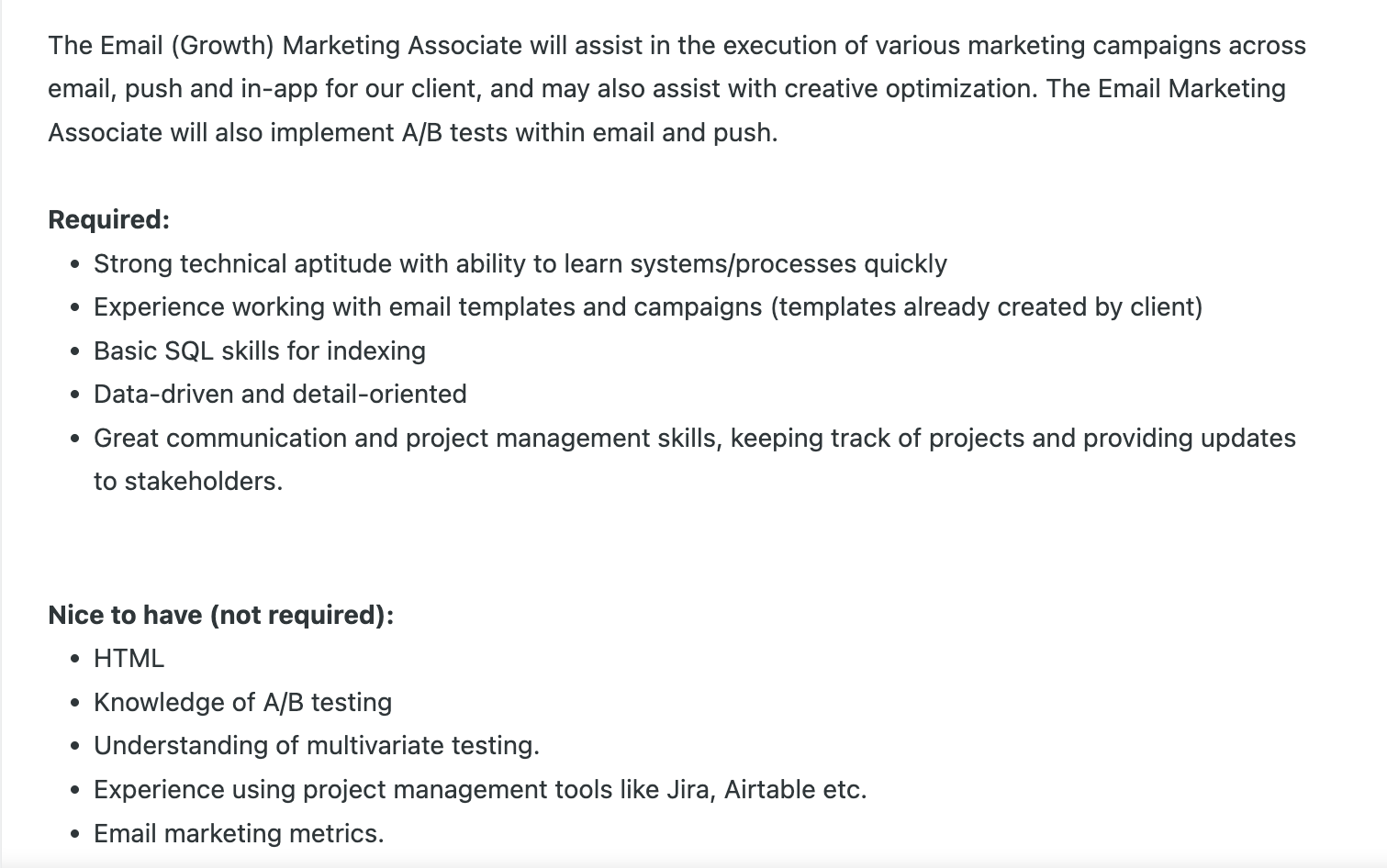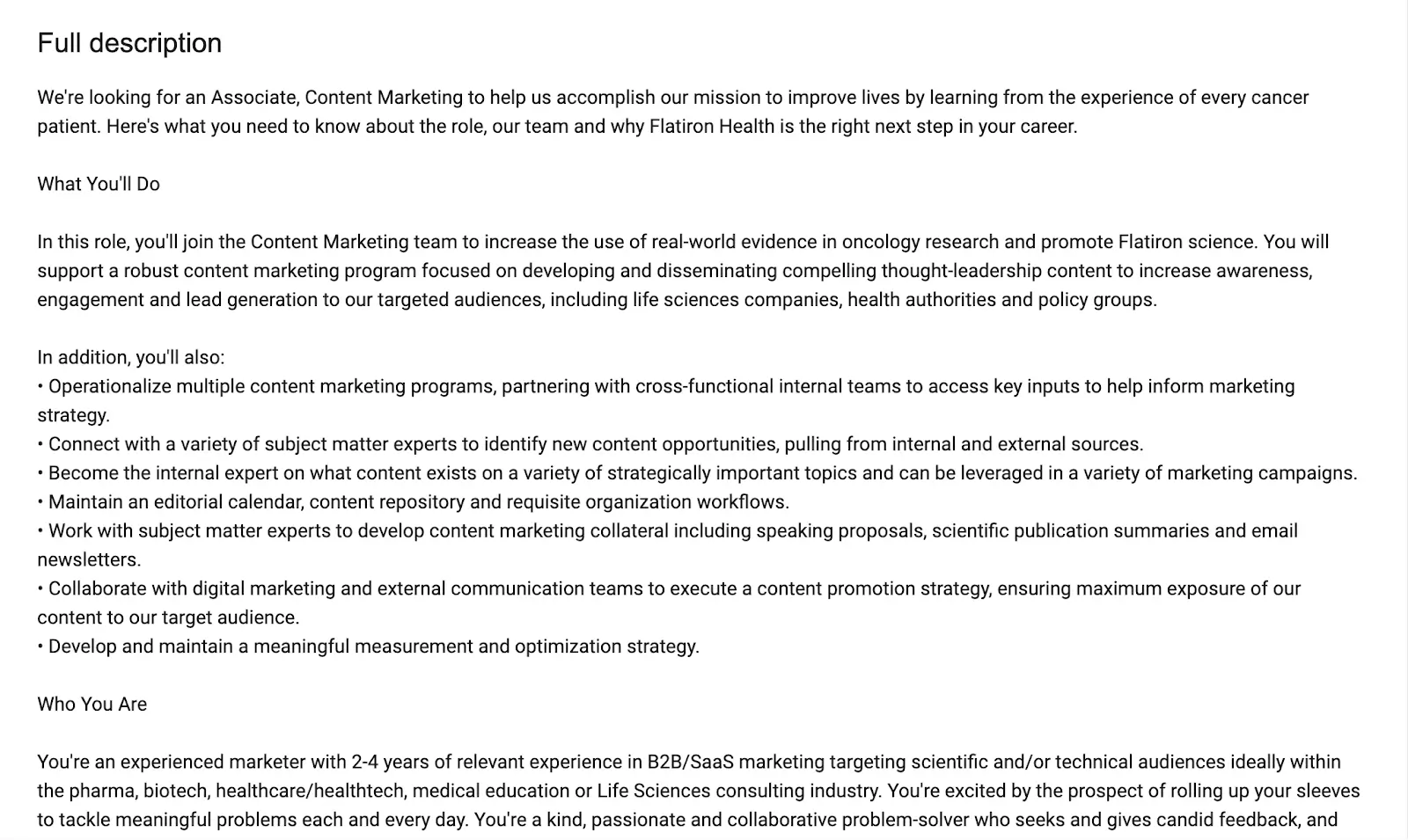The role of a marketing associate is exciting and highly varied. They support their marketing teams as needed and contribute to the success of marketing endeavors. If you’re wondering how to become a marketing associate, this guide will help. We’ll consider what marketing associates do, what is required to gain a job in this role, and a step-by-step guide to becoming one.
Let’s get started! You can use the clickable menu to skip ahead to any section, if you’d like.
- What does a marketing associate do?
- Skills required to become a marketing associate
- How much can you earn working as a marketing associate?
- How to become a marketing associate: a step-by-step guide
- Summary and next steps
1. What does a marketing associate do?
A marketing associate functions like support staff, assisting the marketing team with any available marketing-related tasks. This is typically an entry-level position, perfect for marketing newbies looking to learn the ropes and build experience in the industry.
Marketing associates can work in general marketing or may be employed in a specific kind of marketing. For example, there are content marketing associates and influencer marketing associates. Depending on your desired specialty, the roles of a marketing associate may include:
- Running administrative tasks
- Collating results from marketing research
- Gathering and organizing results from marketing campaigns
- Managing communication between influencers and the marketing team
- Assisting with organizing promotional events like conferences, webinars, and more
- Working on copy and content for blogs, websites, email campaigns and social media platforms
- Monitoring and analyzing competitor performance
The key idea to keep in mind is that you’ll be an executive assistant to the marketing team, lending your skills and resources as needed. Here are a couple of job description examples for marketing associates, so that you can get a sense of employer expectations.

Flatiron Health wants a content marketing associate, so most of the responsibilities listed focus on creating, editing, and analyzing the performance of website content.

The requirements for this email marketing associate role are slightly different—more email-focused. The employer also seems to value soft skills like detail-orientedness more than related industry skills, like A/B testing.
But if you’d like to break into the industry, which skills are in demand?
2. Skills required to become a marketing associate
Marketing associates need several skills to excel at their jobs. To become a marketing associate, you’ll need to develop or improve on the following skills:
Writing and editing
Marketing involves a substantial amount of writing. Depending on the scope of your role, you may need to assist in writing everything from social media copy to website copy, video scripts, ad copy, website content, and more.
Often, if your team works with contract writers, you may need to edit drafts until they’re in publishing shape. You might also need to fill in when the team is missing some writing power from employees taking time off. Overall, you’ll likely be hopping in and out of writing tasks, so creativity—and agile writing skills—will go a long way.
Design
Visuals are invaluable for marketing. As a result, many marketing associates need to have at least a basic knowledge of graphic design using tools like Canva, InDesign, or Adobe Photoshop. You don’t have to be a guru, but you might be required to support the team now and again by brainstorming ideas, reviewing designs, or whipping up some designs yourself.
Good communication
Verbal and written communication skills are a must-have for marketing associates. Because you’ll be working on various projects, you’ll need to provide regular updates to your team leads.
You may also be in charge of analyzing campaign performance, monitoring figures, and managing relationships with some contractors and influencers—all of which you’ll need to keep your team up to date about.
Analytical thinking
While there’s a lot of writing and communication involved, the role of a marketing associate also demands an analytical mind. You’ll need to be able to determine the performance of your team’s marketing campaigns, see what’s working, and figure out how to improve the situation.
Depending on your specialty as a marketing associate, you’ll have to be familiar with the analytics sections of social media platforms, Google Analytics for websites, and even analytics for video platforms like YouTube.
Attention to detail
As a marketing associate, your teammates will rely on you to complete various impactful tasks—all of which should be handled meticulously. Typos in your copy, errors in analytics reports, and other small slip-ups can cost your team money, clients, and a good reputation.
Time management
Juggling several marketing tasks can be time-consuming and, with only 24 hours in a day, proper time management will help you ace your job without burning out. Organizing yourself with checklists and to-do lists can go a long way to help you make the best use of your time.
Jack-of-all-trades mindset
The marketing associate role is one of those frustrating (or thrilling, depending on how you see it) roles requiring a multi-talented person. Writing copy, designing assets, taking care of administrative tasks, and analyzing data demand different skill sets, so it can sometimes feel a bit like you’re doing the job of several people.
If you prefer to be singly focused and enjoy predictable workdays, being a marketing associate may not be a good fit for you. In contrast, if you love meeting new challenges every day and sharpening various skills at your job, this role may be a perfect fit.
3. How much can you earn working as a marketing associate?
With all the work it takes to rock it as a marketing associate, how much do marketing associates earn? We did some research and found the following figures for the United States:
- Glassdoor: According to Glassdoor, the average annual salary for marketing associates in New York City is $72,086.
- Payscale: According to Payscale, the average annual salary for marketing associates in the United States is between $32,000 and $71,000—which is about $51,208 per annum.
- Indeed: According to Indeed, the average annual salary for a marketing associate is $42,544.
4. How to become a marketing associate: a step-by-step guide
If you’re happy with the potential salary for this role, and are rolling up your sleeves ready to get into the workforce, we’ve got some more help for you. Follow this step-by-step guide on how to become a marketing associate.
1. Get a degree or certification
As you’ll see in the full versions of the job descriptions we’ve linked, few marketing associate roles require a degree or certification. However, they can be helpful for people who have no work experience in marketing. It can reassure your potential employer that you at least have some knowledge of marketing and how it works.
While you can get a digital marketing degree or certification, this isn’t a necessity. You could also specialize if you already have an area of interest. For example, get a content marketing certification from or an email marketing certification from Hubspot.
If you’re unable to get a degree, consider joining a digital marketing program through an online school or bootcamp. We have a list of seven top-notch options. And if you still can’t decide whether a degree or bootcamp would suit you best, read our article comparing both options.
2. Gain experience
Fancy degrees and certifications aside, there’s no better way to learn than doing the work. You can also gain experience while taking a certification course or getting a degree. You could intern with a digital marketing agency or practice digital marketing by building a blog or social media account and using your learnings to grow an audience.
Other ways to gain digital marketing experience are by helping out a friend or family member by managing their content, email, or social media marketing. You could also offer your services to a brand or business you admire and learn by growing their audience. As you experiment, you’ll be able to apply all you’re learning and have a job to add to your resume.
Besides your resume, focus on building an online portfolio by documenting your noteworthy work. Did you help a friend grow their website traffic substantially? Add that to your portfolio! All of this will count as valuable experience when you’re applying for jobs.
3. Apply to jobs
It’s time to get out there! It’s normal to feel a bit lost when applying for jobs in a new field. If you’ve never “officially” worked as a marketer, you may feel a little intimidated. But remember that if you’ve worked hard to learn about marketing and gained the necessary experience to excel at it, you’re just as worthy as anyone else looking to enter the field.
You can find marketing associate jobs by searching on Google, LinkedIn, and some Facebook Groups (just search “marketing groups” on Facebook to find some). Following marketers on social media platforms, like Twitter, will also be helpful.
5. Summary and next steps
With all the tips we’ve shared on how to become a marketing associate, we’re confident that you’ll be equipped for your first role. Take time to study the job descriptions we’ve shared—and any others you can find online. These will give you a wide range of potential employer expectations. You can then start working on acquiring the necessary skills.
It’s up to you whether you’ll get a degree or certification, but whatever you do, be sure to gain some marketing experience before applying to jobs. This way, you can boost your resume and be a helpful addition to your team.
Want more information on digital marketing? Check out our free, 5-day digital marketing short course to get an insight into the firld, or check out these posts:
